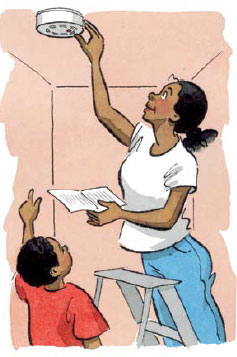
Time Change in the Fall on Sunday November 6, 2011
On the first Sunday in November, daylight saving time ends and the clocks “fall back” one hour.
This happens at 2 am, so you should turn your clocks back one hour before you go to bed this Saturday evening.
Batteries Replacement in Smoke and Carbon Monoxide Alarms
Also, for your safety, you are reminded to replace the batteries in your smoke and carbon monoxide alarms.
“Not all smoke alarm detectors are the same as there may be 3 different ways on how to replace the battery……..depending on which smoke detector alarm you may have.“ In this video, “joe” shows you how to replace a battery in a smoke alarm detector:
Please note that:
- Ontario’s legislation in Canada requires that smoke alarms be installed and maintained on every level of a home, and outside all sleeping areas
- The majority of fire deaths occur in homes that do not have working smoke alarms; installing and maintaining home smoke alarms cuts that risk in half
- Smoke alarms should be tested regularly by pressing the test button
- Gentle vacuuming of your smoke alarms will help avoid the accumulation of dust that has the potential to activate false alarms or prevent an alarm unit from detecting smoke from a fire
- Families should have a step-by-step home escape plan so that all members, especially children and older adults, know how to escape in the event of a fire
Please click on the following links for info on:
Toronto, Ontario, Canada
News Release
November 4, 2011
Reminder to change batteries in smoke alarms when setting clocks this weekend
As clocks are turned back an hour this weekend, the City of Toronto’s Fire Services division reminds residents to replace the batteries in their smoke and carbon monoxide alarms.
“Ontario’s legislation requires that smoke alarms be installed and maintained on every level of a home, and outside all sleeping areas,” said Fire Chief William Stewart. “So this weekend, remember to replace the batteries in every single smoke alarm in your home.”
Most home fires start when people are asleep. Instead of waking you up, smoke from a fire can put you into an even deeper sleep. A working smoke alarm will detect smoke and immediately sound to alert you. This early warning will increase your chances of survival by providing more time to escape.
The majority of fire deaths occur in homes that do not have working smoke alarms. Installing and maintaining home smoke alarms cuts that risk in half.
Smoke alarms are inexpensive and easy to install. They should be tested regularly by pressing the test button. In addition, gentle vacuuming of your smoke alarms will help avoid the accumulation of dust that has the potential to activate false alarms or prevent an alarm unit from detecting smoke from a fire.
In addition to maintaining smoke alarms, families should have a step-by-step home escape plan so that all members, especially children and older adults, know how to escape in the event of a fire.
More information about smoke alarms: http://www.toronto.ca/fire/prevention/smoke_alarms.htm
Advice for dealing with nuisance alarms sounding in the home – a smoke alarm set off by an open oven door, for example – is available at http://makeitstop.ca.
Information about carbon monoxide detectors: http://www.toronto.ca/fire/prevention/carbon.htm
Toronto is Canada’s largest city and sixth largest government, and home to a diverse population of about 2.7 million people. Toronto’s government is dedicated to delivering customer service excellence, creating a transparent and accountable government, reducing the size and cost of government and building a transportation city. For information on non-emergency City services and programs, Toronto residents, businesses and visitors can dial 311, 24 hours a day, 7 days a week.
